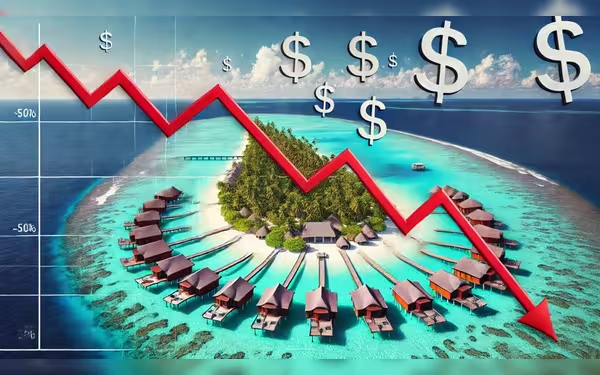Saturday, November 16, 2024 05:54 PM
Maldives Faces Debt Crisis, Turns to India for Support
- Maldives struggles with $1.3 billion debt to China.
- President Muizzu seeks financial aid from India.
- Potential default on Sukuk bonds looms large.
 Image Credits: asiatimes
Image Credits: asiatimesThe Maldives faces a severe debt crisis, prompting President Muizzu to seek crucial financial support from India amid looming defaults.
The Maldives, a picturesque island nation renowned for its stunning resorts and tranquil beaches, is currently grappling with a significant debt crisis. This situation has compelled the country to navigate a complex relationship between its two primary creditors: India and China. As the Maldives faces the possibility of defaulting on its debts, President Mohamed Muizzu's leadership is under scrutiny as he attempts to guide the nation through these challenging economic and geopolitical waters.
As of August 2024, the Maldives' foreign currency reserves stand at a mere $437 million, which is only sufficient to cover about a month and a half of import bills. The financial outlook is concerning, with the country expected to manage between $600 million to $700 million in debt service expenses in 2025, and over $1 billion in 2026. The debt burden is substantial, with the Maldives owing approximately $1.3 billion to China and around $130 million to India.
In light of these pressing financial challenges, President Muizzu recently met with Indian Prime Minister Narendra Modi in New Delhi on October 7. This meeting aimed to secure essential financial support, especially as fears mount over a potential default on a critical $25 million bond payment. Reports indicate that India has approved a $400 million currency swap agreement, providing a crucial lifeline for the Maldives, which has a population of about half a million people, in terms of accessing short-term liquidity.
The debt issues faced by the Maldives are closely linked to Sukuk bonds. Sukuk is a unique financial instrument often described as an Islamic bond. Unlike conventional bonds that involve interest payments, Sukuk represents ownership in tangible assets or a pool of assets. Investors earn returns based on the revenue generated by these assets rather than from interest. If the Maldives were to default on its Sukuk debt, it would mark a historic first for sovereign defaults of this kind.
Without the necessary financial assistance from India, the consequences of missing a Sukuk payment could be dire. Such a default could hinder the Maldives' access to international capital markets, erode investor confidence, and plunge the nation into deeper economic distress. While the recent assurances of support from India may have temporarily averted an immediate default, the broader economic challenges remain unresolved, with significant debt payments looming on the horizon.
The economic troubles of the Maldives are intricately linked to the geopolitical rivalry between India and China. Over the past decade, the Maldives has borrowed extensively from both nations, each offering assistance with differing objectives. As the country navigates this precarious situation, it is essential for its leadership to strike a balance that ensures financial stability while maintaining diplomatic relations with both creditors.
The Maldives stands at a crossroads, facing a critical juncture in its economic journey. The decisions made by President Muizzu and his administration in the coming months will not only determine the financial future of the nation but also shape its geopolitical landscape. As the world watches, the Maldives must find a way to stabilize its economy while fostering relationships that can lead to sustainable growth and development.













